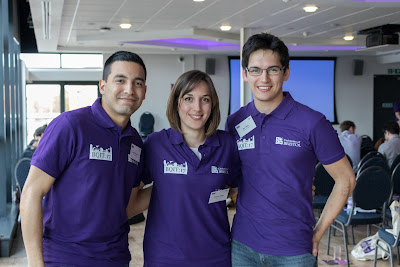Day 3 of the Bristol Quantum Information Technologies (BQIT) workshop

Almut Beige (University of Leeds) and her talk "from optical cavities to cavity-fibre networks" BQIT:17's third and final day saw the workshop draw to a close with another sunny day of talks on detectors, hybrid platforms and integrated photonics. Kicking things off was Sae Woo Nam from NIST. Sae Woo explained two projects around the subject of superconducting nanowire single photon detectors (SNSPDs): one which showed a detection efficiency when used in practice of over 93%, and another on SNSPDs integrated into waveguides. He finished talking about some work with Dave Wineland integrating these detectors with ion traps. University of Münster's Wolfram Pernice followed this by speaking about developing SNSPDs which are capable of detecting single photons in plane, making them suitable for waveguides. The first solid state & hybrid systems session began with Almut Beige from the University of Leeds, who explained how we can better understand how to couple...

